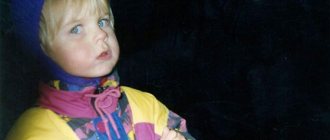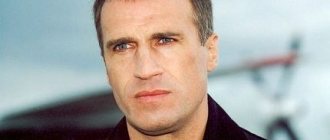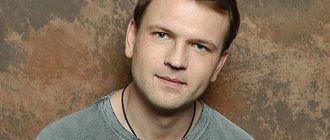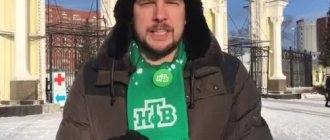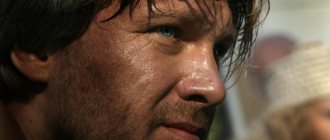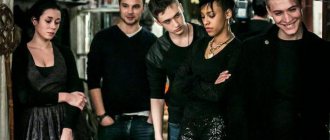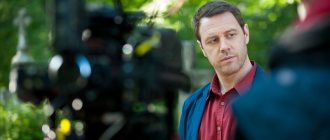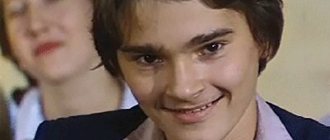From geologist to actor: Belyavsky’s childhood and youth
Alexander Belyavsky in his youth. Photo: 24smi.org
Alexander Belyavsky in his youth. Photo: persons-info.com
Alexander Belyavsky in his youth. Photo: kino-teatr.ru
Alexander Belyavsky was born in Moscow. His parents, Boris and Lyubov Belyavsky, received only primary education before the revolution, and were unable to continue their education after 1917: they had to earn a living. The family lived in a communal apartment. Six people fit in one room: grandmother, parents and three children - the eldest Alexander, Olga and Anatoly. The future actor loved sports and spent a lot of time in the yard. Alexander Belyavsky went to school in 1939. He did not study there for long: two years later the Great Patriotic War began. The father was immediately mobilized into the army, and the mother, grandmother and children were evacuated to Kirov.
Like many guys at that time, the future actor was eager to go to the front, but due to his young age he was not accepted. Then Belyavsky and his friends decided to escape from evacuation and get to Germany on their own. They found a suitcase and began to put crackers, pieces of sugar, matches - everything that could be useful during a long hike. However, the plan was discovered, and the students had to stay with their relatives. The future actor became interested in books: he read historical and adventure novels, works by Pushkin and Lermontov. After the war, Belyavsky returned to Moscow school. But in high school, his love for sports prevented the student from receiving a gold medal: the future actor attended athletics and basketball sections and often missed classes due to competitions.
In 1949, Alexander Belyavsky graduated from school and entered the geological exploration department of the Moscow Institute of Non-Ferrous Metals and Gold. He quickly decided on his specialty. The actor recalled: “I dreamed of reviving the country after the war.” During his studies, Belyavsky visited Central Asia several times: students were sent there for practice. In 1955, he defended his diploma and went on assignment to Irkutsk. The future actor began working in the laboratory of the East Siberian Geological Department, where he analyzed samples. He recalled: “A beautiful girl worked with me - the head of the drama club. One day she came upset. I ask what happened: “Are you sick?” She replies: “No, worse.” I say again: “Unhappy love?” She: “No, our performance is cancelled.” It turned out that the amateur theater was staging the play “Woe from Wit,” and the performer of the role of Molchalin was sent on an unscheduled business trip. Then Alexander Belyavsky agreed to replace the actor. In two weeks he learned the text and soon made his debut on the stage of the Irkutsk Regional Drama Theater. The geologist got used to the role so well that the audience called him to bow several times, and his colleagues nicknamed him “Belyavsky-Stanislavsky.” The artist recalled: “It became interesting to play another person. Not to show yourself, but to show someone else.” After the premiere, he first thought about a career as an actor.
Death
Belyavsky struggled with the disease for eight years, but his health did not improve for long. He had difficulty walking, forgot words, and was unable to hold a pen in his hands. Alexander Borisovich understood that he would no longer return to theater and cinema and would not be able to support his family. On September 8, 2012, he jumped out of a fifth-floor window, and it turned out to be a staircase window. This circumstance makes the actor’s death especially mysterious, because Alexander Belyavsky lived on the second floor, and in order to get to the fifth floor, the poorly moving actor would have to go up specially. Such circumstances of death assured law enforcement agencies that the actor committed suicide.
Alexander Belyavsky
Friends and close families claim that, despite a protracted illness and gloomy prospects for the future, Alexander Belyavsky was distinguished by his love of life, and was also a real “fighter” in life and would not commit suicide. The artist’s wife Lyudmila also still does not believe that he deliberately committed suicide and believes that the cause of the actor’s death was an accident.
In addition, the actor’s little daughter was growing up, and Alexander Borisovich simply could not leave his family, as opponents of the version of the actor’s suicide claim. The actor’s eldest daughter told the press that due to her illness, her father experienced fainting and bouts of dizziness. The woman is sure that on that ill-fated day, Alexander Borisovich had an attack, which led to the tragedy.
Funeral of Alexander Belyavsky
At the same time, some of the actors believed in the explanation of law enforcement agencies and even found an explanation for this act of the actor. Belyavsky's colleague Stanislav Sadalsky said that the Soviet artist was driven to death by prolonged poverty and blamed the Union of Cinematographers for the tragedy because talented actors in old age cannot lead a decent life and are struggling for existence.
Stanislav Sadalsky claims that with the huge fees of popular actors, all other artists are paid so much that it is impossible to live on this money. Separately, the actor noted Soviet cinema; films of this period are still regularly shown on television, providing TV channels with advertising revenue, but the film crew of these films does not receive the required royalties.
The grave of Alexander Belyavsky
The grave of Alexander Belyavsky is located in Moscow. The urn with the ashes of the famous actor was buried at the Kuzminskoye cemetery.
Learn Polish for a role: studies and first films
Alexander Belyavsky as Henry Davis in the feature film “Night Without Mercy” by Alexander Faintzimmer (1961)
Alexander Belyavsky (left) as Frank in Eduard Zmoiro’s feature film “Foreigners” (1961)
Alexander Belyavsky as electrical engineer Kolya in Sergei Yutkevich’s feature film “Stories about Lenin” (1957)
In 1957, Alexander Belyavsky returned to Moscow. During the day he worked as a junior researcher at the NITRZoloto Institute, and in the evening he came to the drama club and learned the basics of stage speech. Sometimes the geologist was involved in performances at the Teacher's House. The more time Belyavsky spent at rehearsals, the more he wanted to become an actor. Six months later, he decided to change his life: he quit his job and submitted documents to VGIK and the Boris Shchukin Theater Institute. VGIK did not accept him, but at the Shchukin School the actor passed the entrance exams on the first try. Alexander Belyavsky entered the course of the famous artist Vladimir Etush.
It was not easy to study under the guidance of the eminent actor: he strictly assessed the sketches performed by the students, rarely praised them and often threatened with expulsion. Belyavsky's classmates were artists Ivan Bortnik, Zinovy Vysokovsky, Irina Bunina, Lyudmila Maksakova, Konstantin Zheldin and many others. At the end of his first year, Alexander Belyavsky starred in a movie for the first time: director Sergei Yutkevich approved him for a cameo role in the film “Stories about Lenin.” The actor played the role of electrical engineer Kolya, who was not allowed to marry his beloved. After studying and filming, Belyavsky had to work part-time. If as a geologist he earned 120 rubles a month, then as a college student he received a scholarship of 20 rubles. The artist translated scientific texts, and on holidays he dressed up as Santa Claus and held New Year's parties.
In 1960, Belyavsky again found himself on the set - this time he was entrusted with the main character in the film “Save Our Souls.” In the story, during a voyage abroad, a cadet at a nautical school rescued a rich Englishwoman from a sinking yacht. Belyavsky's partner was Lydia Fedoseeva-Shukshina. In the same year, the fourth-year student collaborated with director Eduard Zmoiro, who was filming a film feuilleton about Soviet dudes, “Foreigners.” Belyavsky played the role of a Soviet journalist who pretended to be a foreign guest and observed the reaction of the dudes.
In 1961, Alexander Belyavsky graduated with honors from the Shchukin School. As one of the best students of the course, he was invited to the Satire Theater. During the first months, he sometimes missed rehearsals: he was filming the film “Night Without Mercy,” where he played an American pilot. Unlike cinema, in the theater the young actor was trusted only with episodic roles. Belyavsky played in the plays “The Heirs of Rabourdin”, “Dowry Wedding”, “Fakir for an Hour”.
In 1964, the actor was offered to play the main character in the Polish film Interrupted Flight. Moreover, Belyavsky was approved for the role without an audition: director Leonard Buchkovsky was looking for an artist who had already played pilots, and saw on Mosfilm a still from the film “A Night Without Mercy.” According to the plot of the new film, pilot Vladimir Mironov made an emergency landing in Warsaw and decided to find the girl he fell in love with 17 years ago during the war. For the role, Alexander Belyavsky specially learned Polish: the film was shown in the USSR with Russian subtitles. For filming in the film, the actor received the title of Honored Cultural Worker of Poland.
Immediately after the release of the film “Interrupted Flight” on the big screen, Alexander Belyavsky left the Satire Theater. He recalled: “I voluntarily left the Satire Theater and now I regret that I made a mistake. It was the time of the first perestroika, it was then called the Thaw, and I wanted the performances to be civil, sharp, modern, about today... In a word, out of youth, out of ardor, I submitted my resignation.” The actor went to work at the Moscow Drama Theater. K.S. Stanislavsky (today – “Electrotheater “Stanislavsky”), where at that time they began to stage plays by foreign playwrights - Bertolt Brecht, Bernard Shaw and Pavel Kogout. But the theater had its own stars: artists Georgy Burkov, Albert Filozov, Evgeny Leonov and many others, so Alexander Belyavsky was involved in only a few performances.
Roles in the theater
After receiving his diploma (with honors) in 1961, Alexander Borisovich was invited to the Satire Theater, where he worked for 3 years. After leaving, he maintained friendly relations with his stage colleagues. When in 1966 Belyavsky became the host of the entertaining and humorous program “Zucchini 13 Chairs”, the main roles in it were played by artists from the Moscow Theater of Satire.
In 1964, the young actor joined the troupe of the Moscow Theater of K. Stanislavsky. But he didn’t stay here long either. After 2 years, he changed his place of work again - he went to the theater-studio of a film actor. Belyavsky, as a rule, was trusted to play the role of negative characters, but the audience still loved the tall, fit artist.
There was a long pause in Alexander Borisovich’s theatrical career, due to a busy filming schedule. In 1999, the actor returned to the stage. His most notable roles in the theater in private performances: “The Empress” (Counselor), “The Lion in Winter” (Henry), “A la buffet with holy water” (Anatoly).
Photo of Alexander Belyavsky in his youth
“At best, they’ll scold you”: filming in Khutsiev’s film “July Rain”
Alexander Belyavsky as Volodya in Marlen Khutsiev’s feature film “July Rain” (1966)
Alexander Belyavsky (right) and Mikhail Derzhavin in the television program “Zucchini “13 Chairs” (1973)
Alexander Belyavsky as Sergei Krylov in Sergei Mikaelyan’s feature film “I’m Going into the Storm” (1965)
Alexander Belyavsky was often offered to act in films. In 1965, he received the main role in the film about two physicists, “Walking into a Storm.” And a few months after the end of filming, he was already working on the set of the film “They were known only by sight,” where he played the Soviet intelligence officer and saboteur Sergei Kulagin. In 1966, Marlen Khutsiev invited Belyavsky to his film “July Rain”. At the same time, director Viktor Georgiev called with an offer. The actor recalled: “I had to choose between two films. Both there and there I was approved for the main role. This is the film "Strong in Spirit" and "July Rain". They told me: “Do you understand that if you film with Khutsiev, at best they will scold you? And Georgiev has a commissioned painting, and you immediately receive a title, they will increase your rate and give you an apartment.” I chose Khutsiev." The film “July Rain” told about the life of engineer Lena and young scientist Volodya from July until late autumn. The director said that he was filming not about how feelings are born, but about how they fade away. At first glance, there was no conflict in the picture. The actors faced a difficult task: to play as naturally as possible and speak in simple words about complex, philosophical problems. Alexander Belyavsky's partner was Evgenia Uralova.
In 1966, Alexander Belyavsky came up with the idea of a humorous TV show, “Zucchini “13 Chairs.” Since filming the film “Interrupted Flight,” the actor had many friends in Poland, and he was often brought copies of the satirical magazine “Stilettos.” Belyavsky liked the miniatures published there so much that he suggested that the director of the Satire Theater, Georgy Zelinsky, turn them into a performance. They decided to combine different scenes with the location of the action: according to the idea, the actors were regulars at the tavern and told each other stories. Gradually, the list of magazines from which sketches were taken was supplemented by the German Eulenspiegel, the Hungarian Ludas Matyi and the Soviet Krokodil. In 1966, the first episode of the program was released. Alexander Belyavsky became the presenter. The program immediately gained popularity. Actor Mikhail Derzhavin said: “For most television viewers, our silly, sometimes naive skits and reprises served as a kind of outlet in their regimented lives, an oasis, a light in the television window, usually blinkered by dull officialdom.” Even the General Secretary of the CPSU Central Committee, Leonid Brezhnev, watched the program. However, Alexander Belyavsky stayed as the host of “Zucchini “13 Chairs” for only a year: he could not combine it with filming. There wasn't enough time for the stage either. In 1966, the artist left the Moscow Drama Theater. K.S. Stanislavsky and began working at the State Film Actor Theater, where they easily let him go to filming.
In 1967, Belyavsky played the main role in the film “The Mysterious Monk”, a year later in “24-25 Doesn’t Return”, and a year later he was approved for the film “The Main Witness”. The actor did not refuse offers from Polish directors. It was not easy to get a business trip abroad, so in Warsaw Alexander Belyavsky sometimes starred in several films at the same time. In 1969, the actor alternated between working on Jerzy Passendorfer’s war drama “Day of Epiphany” and Konrad Nałęcki’s series “Four Tankmen and a Dog.”
Filmography
- 1965 — “I’m going into the storm”
- 1966 - “No and Yes”
- 1966 — “Four Tankmen and a Dog”
- 1969 — “Zucchini “13 chairs”
- 1974 — “Light at the end of the tunnel”
- 1975 - “The Irony of Fate, or Enjoy Your Bath!”
- 1979 - “The meeting place cannot be changed”
- 1987 — “Defeat”
- 1989 — “Entrance into the Labyrinth”
- 1993 — “Against All Odds”
- 2001 — “Nina”
- 2001 — “Antikiller”
- 2002 - “Tomorrow will be tomorrow”
- 2002 — “Brigade”
- 2003 — “The best city on Earth”
Star roles: Zhenya Lukashin's friend and handsome adventurer Fox
Alexander Belyavsky as Evgeny Fox in the serial feature film by Stanislav Govorukhin “The meeting place cannot be changed” (1979)
Alexander Belyavsky (right) as Sasha in Eldar Ryazanov’s feature film “The Irony of Fate, or Enjoy Your Bath!” (1975)
Alexander Belyavsky as Vasily Shelgi in the multi-part feature film by Leonid Kvinikhidze “The Collapse of Engineer Garin” (1973)
Belyavsky tried to play heroes with different characters. He said: “Many actors play themselves, use it all their lives and are quite successful. He changed his costume and is already starring in another film. I’m just not interested in working like this myself. It's terrible when you're bored! Especially when art is boring.” In 1973, the four-part television film “The Collapse of Engineer Garin” was released. A fantastic story about a scientist who invented laser weapons of mass destruction and wanted to take over the world, based on the novel by Alexei Tolstoy “The Hyperboloid of Engineer Garin.” According to the plot, Alexander Belyavsky, in the role of criminal investigation officer Shelga, had to stop the mad physicist.
In 1975, director Eldar Ryazanov invited Alexander Belyavsky to star in the film “The Irony of Fate, or Enjoy Your Bath!” The actor played Sasha, a friend of the main character Evgeniy Lukashin. The film brought together an eminent cast: Andrei Myagkov, Barbara Brylska, Yuri Yakovlev, Alexander Shirvindt, Georgy Burkov, Liya Akhedzhakova. Therefore, they worked at night, when the actors were not busy in the theater. The scenes in the bathhouse were filmed first. The steam room in reality was the ground floor of Mosfilm, not far from the glass block wall: benches from the studio corridors were lowered there, palm trees and towels were brought. It was cold in the room, so the actors gradually replaced the fake drinks with real ones. Soon Ryazanov noticed that the artists were intoxicated, and with a scandal he postponed the shooting to the next day. But nevertheless, the first frames were included in the film. One of Belyavsky’s most memorable phrases in the film was: “This is completely unheard of, guys: the doctor refuses to drink to his health!”
In January 1976, the film was shown on TV, and on February 7, due to numerous requests from viewers, it was repeated again. In 1977, the film was awarded the USSR State Prize.
The next star role for Belyavsky was the recidivist Evgeniy Fox from the detective story “The Meeting Place Cannot Be Changed.” The actor did not immediately agree to filming. Alexander Belyavsky recalled: “I treated Fox as a completely passable role. Detective. No one could have imagined such success. <…> Govorukhin’s name had not yet been heard at that moment.” . At first, actor Boris Khimichev was approved for the role of Fox, but after the first days of filming, director Stanislav Govorukhin decided to change his mind. Belyavsky was recommended by Vladimir Vysotsky, who played the main character in the film. The Bard did not know the artist personally, but had seen him in other films. The role was difficult for Alexander Belyavsky: “I panicked terribly - I still couldn’t find the picture of the role or figure out Fox’s character. And then Volodya, without foppishness or edification, told me a very precise phrase: you should not play a bandit, but a man who respects himself very much.” The interrogation scene was filmed first. Fox had to deny all charges.
And I’m sitting, looking in the mirror at “this one,” I want to tell myself, I’m Fox. And I can’t! <…> I think, let me change my face. I ask the make-up artist for a piece of cotton wool and put it behind my cheek, as if it were a tumor. Disgusting! And it was summer. It’s the month of June, the cherries are ripe in Odessa, everyone has made cherry jam. I see that the girls, having finished their work with makeup, sat down to drink tea with cherry jam. He took the cotton wool, rolled it into the jam and put it in his mouth. And the jam is liquid, if you press the cotton wool with your tongue, it’s like blood is flowing down your chin! Fine! There is already something to grab onto!
Alexander Belyavsky
After the release of the film in 1979, Belyavsky began to be recognized on the streets, fans called home and waited at the theater after performances. Fox's role influenced the actor's film career. He recalled: “For directors, I became not Belyavsky, but Fox; directors began to offer me only the roles of negative characters. <...> After the screening of the series “The Meeting Place Cannot Be Changed,” I was often offered negative roles in films, but internally I did not become any worse.” . In 1981, Belyavsky played a CIA officer who carried out a coup in the film “Pomegranate Islands.” In 1986 - a White Guard saboteur in the film “Head of the Gorgon”.
In the 1980s, the actor was often invited to film foreign films. Belyavsky worked in Poland, Bulgaria, Czechoslovakia, North Korea, and East Germany. In the USSR, he mainly played episodic roles and voiced films. The voice of Alexander Belyavsky was spoken by actor Kenneth Haig from the film “Cleopatra”, Italian Alighiero Noschese from “The Incredible Adventures of Italians in Russia”, Boris Khmelnitsky from “Arrows of Robin Hood”. Belyavsky recalled: “I voiced King Louis XIV in the films “Angelique - Marquise of the Angels,” “Angelique and the King.” He worked with a clothespin on his nose to create a French dialect. <...> If a person not familiar with dubbing came to our sound pavilions, he would look at the sound actors as fools: we unwittingly repeat even the movements that our hero makes on the screen" . In total, the actor voiced about 90 foreign films. In 1988, Alexander Belyavsky was awarded the title of Honored Artist of the RSFSR.
Fox
In the filmography of actor Alexander Belyavsky, the role of a bandit from the film “The Meeting Place Cannot Be Changed” is special. Most viewers recognize him by this. Despite the fact that his role was negative, nevertheless, many women in the country were in love with Fox - gallant, stately, so un-Soviet. In Zharov’s film “And again Aniskin...” his role was also negative. And yet, his goal was to create a wide variety of images, because for him it was simply unacceptable to repeat himself or play himself.
Personal life: two marriages of Alexander Belyavsky
Alexander Belyavsky with his first wife Valentina Belyavskaya (right) and son Boris. 1970s Photo: biography-life.ru
Alexander Belyavsky with his first wife Valentina Belyavskaya. Photo: wellnesso.ru
Alexander Belyavsky with his second wife Lyudmila Tikhonova and daughter Alexandra. Photo: damskiyclub.ru
The actor got married for the first time in 1955. His wife was student Valentina. They both studied at the Moscow Institute of Non-Ferrous Metals and Gold, only Alexander studied at the geological faculty, and Valentina at the metallurgical faculty. Immediately after the wedding we went on assignment to Irkutsk. Valentina Belyavskaya recalled: “We had such a honeymoon. We rented a room there. It was cold, food supply was poor. Our parents sent us parcels from Moscow. Then we made friends there. In general, there was a very good, cheerful group of Muscovites who arrived.” In 1973, the family’s first child was born, but two years later the son died tragically. Then the couple decided to take the boy Andrei from the orphanage. In 1976, another child appeared in the family: daughter Nadezhda was born. In the early 1980s, the couple divorced. The actor’s adopted son died when he was 20 years old: Andrei Belyavsky fell out of a window.
Alexander Belyavsky met his second wife in Leningrad in the late 1980s. He was in a hurry to film, it was raining, and at a traffic light the actor decided to stand under an umbrella next to a pretty girl. She turned out to be a traumatologist Lyudmila Tikhonova. Soon they got married. In August 2003, a daughter, Alexandra, was born into the family.
Tragedy in the family: the death of a son and divorce from his wife
Alexander got married when he was still 23 years old. His wife Valentina
I couldn’t give birth for a long time.
The long-awaited son was born after 18 years of marriage. He was named Boris
- in honor of the father of Alexander Belyavsky. Of course, they doted on the boy and blew away specks of dust from him. They even hired a nanny so that the baby would not be left unattended for a minute.
And it had to happen that it was the nanny who did not look after the child. Two-year-old Borya, playing at the dacha, fell into a pond when no one was around - the nanny was gone somewhere. The boy drowned. And Belyavsky almost went crazy with grief. He blamed himself for entrusting the most precious thing he had to a stranger.
The depression lasted for a very long time. He either sobbed loudly, or stunned himself with alcohol, and moved away from his wife. And after some time, Valentina told him: if you, a strong man, don’t find the strength to live on, then let’s hold hands and jump from the balcony together...
These words from his wife had a sobering effect on Alexander. Slowly and difficultly, he came back to life. To fill the terrible void left by the death of their son, they took a two-year-old boy, Andryusha
.
And soon Valentina gave birth to a daughter. It would seem that everything has worked out. But, apparently, an irreversible breakdown occurred in the artist’s soul. He announced to his wife that he had fallen in love with another woman and was leaving the family.

